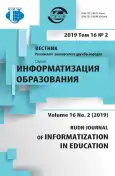Prospects for promoting the online model of Russian education exports in Africa
- Authors: Krasnova G.A.1
-
Affiliations:
- Russian Presidential Academy of National Economy and Public Administration
- Issue: Vol 16, No 2 (2019)
- Pages: 117-127
- Section: FOREIGN EXPERIENCE OF INFORMATIZATION OF EDUCATION
- URL: https://journal-vniispk.ru/2312-8631/article/view/333494
- DOI: https://doi.org/10.22363/2312-8631-2019-16-2-117-127
- ID: 333494
Cite item
Full Text
Abstract
Problem and goal. The task of increasing the number of foreign students twice by 2024, set before the Russian universities by the country’s leadership in the framework of the national project “Education”, will require a revision of the traditional approach to the recruitment of foreign students. It is obvious that in conditions of limited organizational, human and financial resources of the country’s universities will require fundamentally new forms and technologies of recruiting, and in the future and new forms of training of students. The article deals with the actual problem of implementation and realization of the online model of export of Russian education in the conditions of expansion of export activity of Russian universities for the recruitment of foreign students in Africa. The purpose of the described study was to determine the basic conditions for the implementation of the online model of export of Russian education in Africa, identifying the target countries of Africa, promising for recruiting students. Methodology. The definition of the features and conditions of the online model of education export was carried out on the basis of the analysis of the best practices of foreign universities (TOP-500) and Russian universities (participants of Project 5-100). The main conditions for the implementation of this online model of education exports, the availability of appropriate infrastructure, the potential effectiveness of the export model in Africa (target countries) are analyzed. Results. The study revealed that the use of the online model of export of education by Russian universities in Africa, based on the use of telecommunication technologies, can affect the increase in the number of Foreign students and have a positive impact on the effectiveness of recruiting activities of the Russian University in modern conditions through the introduction of online recruiting methods of recruitment of foreign students, attracting a new audience of foreign students, the implementation of online training in Africa, which, ultimately, greetings to the increase in university income from educational activities received from foreign sources. Conclusion. It is shown that the use of the online model of education exports can have a significant impact on the competitiveness of Russian universities in Africa and the increase in the number of foreign students enrolled in online programs of Russian universities in their target countries.
About the authors
Gulnara A. Krasnova
Russian Presidential Academy of National Economy and Public Administration
Author for correspondence.
Email: director_ido@mail.ru
doctor of philosophy, full professor, chief researcher of the Russian Presidential Academy of National Economy and Public Administration
82 Prospekt Vernadskogo, bldg. 1, Moscow, 119571, Russian FederationReferences
- Grigor’ev S.G., Grinshkun V.V., L’vova O.V., Shunina L.A. Ispol’zovanie sredstv informatizacii dlya formirovaniya tolerantnosti pri obuchenii v techenie vsej zhizni [Use of means of informatization for the formation of tolerance in teaching in the lifelong]. Vestnik Moskovskogo gorodskogo pedagogicheskogo universiteta. Serija: Informatika i informatizacija obrazovanija [Bulletin of the Moscow City Pedagogical University. Series: Informatics and Informatization of Education]. 2016. No. 1(35). Pp. 8—19.
- Grinshkun V.V., Krasnova G.A. Razvitie obrazovaniya v epohu chetvertoj promyshlennoj revolyucii [Development of education in the era of the fourth industrial revolution]. Informatika i obrazovanie [Informatics and education]. 2017. No. 1(280). Pp. 42—45.
- Didenko G.A., Stepanova O.A. Sovremennye aspekty informatizacii: koncepciya informacionnyh servisov [Modern aspects of informatization: the concept of information services]. Informatika i obrazovanie [Informatics and education]. 2018. No. 7(296). Pp. 57—61.
- Katunina A.S. Sovremennye tekhnologii v IT-rekrutinge [Modern technologies in IT-recruiting]. Upravlenie razvitiem personala [Personnel development management]. 2018. No. 2. Pp. 118—130.
- Krasnova G.A., Teslenko V.A. Konceptual’nye podhody k setevomu vzaimodejstviyu vuzov: luchshie praktiki i zarubezhnyj opyt [Conceptual approaches to network interaction of universities: best practices and foreign experience]. Vestnik Moskovskogo gorodskogo pedagogicheskogo universiteta. Serija: Informatika i informatizacija obrazovanija [Bulletin of the Moscow City Pedagogical University. Series: Informatics and Informatization of Education]. 2018. No. 1(43). Pp. 78—86.
- Savel’eva O.A., Bobodzhonova O.N. Vliyanie internet-sredy na formirovanie lichnosti obuchayushchihsya v sovremennom informacionnom obshchestve [The influence of Internet environment on the formation of pupils’ personality in modern information society]. Informatika i obrazovanie [Informatics and education]. 2018. No. 5(294). Pp. 27—30.
- Tihonova I.O. Novye vozmozhnosti rekrutinga XXI veka [New opportunities of recruiting of the XXI century]. Nauchnyj al’manah [Scientific almanac]. 2015. No. 7(9). Pp. 1277—1280.
- Filippov V.M., Krasnova G.A., Grinshkun V.V. Transgranichnoe obrazovanie [Cross-border education]. Platnoe obrazovanie [Paid education]. 2008. No. 6. Pp. 36—38.
- Internet World Stats. https://www.internetworldstats.com/ (accessed: 27.02.2019).
- ICEF Monitor: new agreement aims to expand online learning in Africa. http://monitor.icef. com/2017/02/new-agreement-aims-to-expand-online-learning-in-africa/ (accessed: 27.02.2019).
- The Value of Education Higher and higher. HSBC, 2017. https://me.popsugar.com/how-to/ HSBC-Value-Education-2017-Study-44096013 (accessed: 27.02.2019).
- The shape of things to come: higher education global trends and emerging opportunities to 2020. British Council, 2012. 76 p.
- trends transformative changes in higher education. British Council, 2017. https://www. britishcouncil.vn/en/programmes/education/internationalisation /knowledge-centre/10-trendstransformative-changes-higher-education (accessed: 27.02.2019).
Supplementary files









